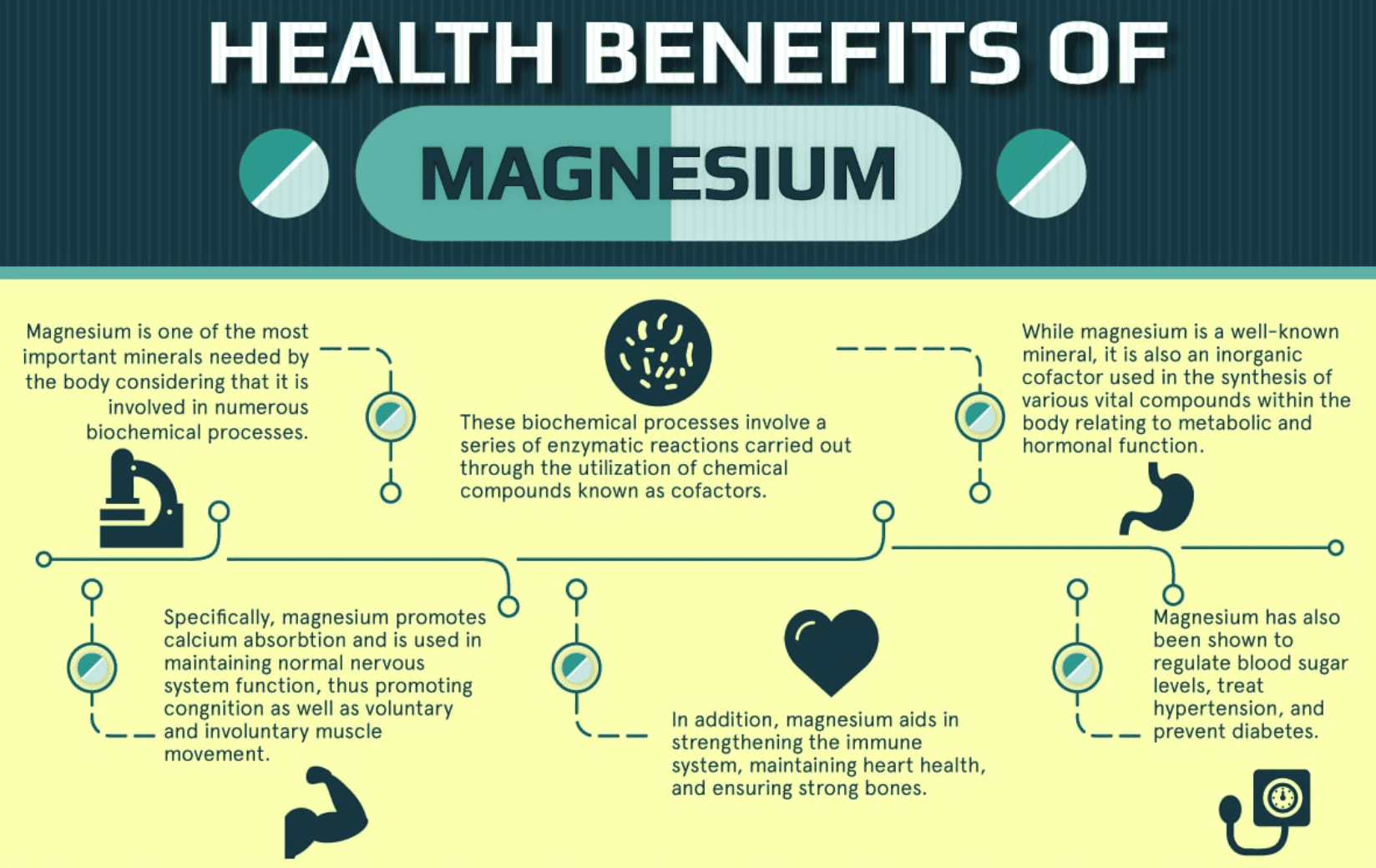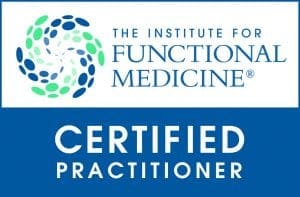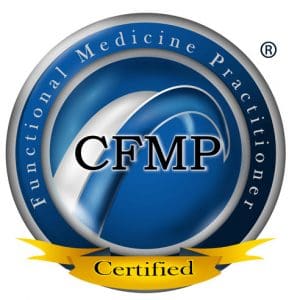Table of Contents
Introduction
The cardiovascular system allows oxygen-rich blood and other enzymes to travel throughout the body and allow the various muscle groups and vital organs to function and do their jobs. When multiple factors like chronic stress or disorders begin to affect the heart, it can lead to cardiovascular issues that mimic chest pains or heart disorders that can affect a person’s daily lifestyle. Fortunately, there are many ways to ensure the heart stays healthy and prevent other chronic issues that can disrupt the body’s function. Today’s article looks at one of the essential supplements known as magnesium, its benefits, and how it corresponds with heart health in this 3-part series. Part 2 looks at how magnesium lowers blood pressure. Part 3 looks at the different foods containing magnesium and improves health. We refer our patients to certified providers that consolidate many available treatments for many individuals suffering from low magnesium levels affecting the cardiovascular system and correlating to chronic conditions that can cause overlapping risk profiles in the body. We encourage each patient by referring them to associated medical providers based on their diagnosis when it is appropriate. We understand that education is a fantastic way when asking our providers intricated questions at the patient’s request and understanding. Dr. Jimenez, D.C., only utilizes this information as an educational service. Disclaimer
What Is Magnesium?

Have you noticed that your blood glucose levels are elevated? What about feeling low on energy? Or have you been dealing with constant headaches? When many individuals are dealing with these issues that affect their health, it could be due to low magnesium levels affecting their bodies. Studies reveal that magnesium is the fourth most abundant cation that is a cofactor for 300+ enzymes in the body. Magnesium is an essential supplement that is an important electrolyte that hydrates the intracellular water intake in the body. Additional studies have revealed that magnesium plays a huge role in the body’s metabolism and involves hormone receptor bindings to allow muscle contraction, cardiac excitability, neurotransmitter release, and vasomotor tone. Magnesium is also necessary for the body as it is an active transport for potassium and calcium to go across the cellular membrane for proper functioning.
The Benefits Of Magnesium

When it comes to magnesium, there are many beneficial properties that it can provide to the body. Some of the benefits of taking magnesium include:
- Boost exercise performance
- Regulating neurotransmitters
- Reduce depression and anxiety
- Regulate blood glucose levels
- Prevent migraines
When many individuals have low magnesium levels, studies reveal that common health conditions like migraines, metabolic syndrome, diabetes, and cardiac arrhythmias. These various health conditions can affect not only the vital organs in the body, but when a person has low magnesium levels, their energy levels are low, and they begin to feel sluggish. Additionally, a person with low energy levels from magnesium deficiency can affect their health and wellness. Studies reveal that magnesium deficiencies could cause overlapping risk profiles in the body, which can develop into chronic disorders like cardiovascular issues, hypotension, and osteoporosis.
An Overview Of Magnesium

Biomedical physiologist Alex Jimenez will be going over magnesium with you. But before we get started, it’s important to define some things. The first one is glycolysis. So if we break that down, glyco means carbohydrates or sugar. Lysis implies the breakdown of such glycolysis, the breakdown of carbohydrates. The next one is the co-factor. A co-factor is defined as a non-protein chemical compound that is required for enzymatic activity. You can think of this as the enzyme being the car, and the co-factor is the key. With the key, the vehicle can get started. So what is magnesium? Magnesium is a positively charged cat ion and an electrolyte we need for our bodies. So why is magnesium important? Because it supports proper muscle and nerve function? It regulates glucose metabolism or the breakdown of carbs in glycolysis. And five out of the ten steps in glycolysis require magnesium as a co-factor. So that is over 50% of the breakdown of carbs requires magnesium as a co-factor. It helps regulate our bone density.
Magnesium & Heart Health

As stated earlier, magnesium is an essential supplement that helps with intracellular water intake and helps with the body’s energy levels. So how does magnesium help the heart? Studies reveal that the many diverse roles that magnesium offers to the body allow it to regulate blood pressure and glycaemic control associated with the heart. Many cardiac patients take magnesium to ensure the intracellular membranes travel through the heart. Additionally, additional studies reveal that foods rich in magnesium can help lower the risk of major cardiovascular risks like ischemic heart disease and coronary heart disease. Magnesium also helps reduce pain-like symptoms associated with metabolic syndrome and hypertension that can affect the various muscle groups and joints. When the intracellular membrane is supported by magnesium and travels from the heart to the rest of the entire body, fewer pain-like symptoms can affect joints, muscles, and vital organs.
Conclusion
Magnesium is the fourth most abundant essential supplement that provides intracellular water intake in the body and can provide support to the cardiovascular system. This supplement plays a huge role in the body as it supports its metabolism and makes sure that it reduces cardiovascular issues. When many individuals have low magnesium levels, chronic problems like cardiovascular disorders, metabolic syndrome, and musculoskeletal disorders will develop and affect the body’s function to work properly. Incorporating magnesium-rich foods or supplements can lower the risk of these issues from progressing further and help regulate the elevated hormone levels affecting the body. Part 2 will look at how blood pressure is reduced when taking magnesium.
References
Al Alawi, Abdullah M, et al. “Magnesium and Human Health: Perspectives and Research Directions.” International Journal of Endocrinology, U.S. National Library of Medicine, 16 Apr. 2018, https://www.ncbi.nlm.nih.gov/pmc/articles/PMC5926493/.
Allen, Mary J, and Sandeep Sharma. “Magnesium – Statpearls – NCBI Bookshelf.” In: StatPearls [Internet]. Treasure Island (FL), StatPearls Publishin, 3 Mar. 2022, https://www.ncbi.nlm.nih.gov/books/NBK519036/.
DiNicolantonio, James J, et al. “Magnesium for the Prevention and Treatment of Cardiovascular Disease.” Open Heart, U.S. National Library of Medicine, 1 July 2018, https://www.ncbi.nlm.nih.gov/pmc/articles/PMC6045762/.
Rosique-Esteban, Nuria, et al. “Dietary Magnesium and Cardiovascular Disease: A Review with Emphasis in Epidemiological Studies.” Nutrients, U.S. National Library of Medicine, 1 Feb. 2018, https://www.ncbi.nlm.nih.gov/pmc/articles/PMC5852744/.
Schwalfenberg, Gerry K, and Stephen J Genuis. “The Importance of Magnesium in Clinical Healthcare.” Scientifica, U.S. National Library of Medicine, 2017, https://www.ncbi.nlm.nih.gov/pmc/articles/PMC5637834/.
Swaminathan, R. “Magnesium Metabolism and Its Disorders.” The Clinical Biochemist. Reviews, U.S. National Library of Medicine, May 2003, https://www.ncbi.nlm.nih.gov/pmc/articles/PMC1855626/.
Disclaimer
General Disclaimer
Professional Scope of Practice *
The information herein on "Why Is Magnesium Important? (Part 1)" is not intended to replace a one-on-one relationship with a qualified health care professional or licensed physician and is not medical advice. We encourage you to make healthcare decisions based on your research and partnership with a qualified healthcare professional.
Blog Information & Scope Discussions
Welcome to El Paso's Premier Wellness and Injury Care Clinic & Wellness Blog, where Dr. Alex Jimenez, DC, FNP-C, a Multi-State board-certified Family Practice Nurse Practitioner (FNP-BC) and Chiropractor (DC), presents insights on how our multidisciplinary team is dedicated to holistic healing and personalized care. Our practice aligns with evidence-based treatment protocols inspired by integrative medicine principles, similar to those found on this site and our family practice-based chiromed.com site, focusing on restoring health naturally for patients of all ages.
Our areas of multidisciplinary practice include Wellness & Nutrition, Chronic Pain, Personal Injury, Auto Accident Care, Work Injuries, Back Injury, Low Back Pain, Neck Pain, Migraine Headaches, Sports Injuries, Severe Sciatica, Scoliosis, Complex Herniated Discs, Fibromyalgia, Chronic Pain, Complex Injuries, Stress Management, Functional Medicine Treatments, and in-scope care protocols.
Our information scope is multidisciplinary, focusing on musculoskeletal and physical medicine, wellness, contributing etiological viscerosomatic disturbances within clinical presentations, associated somato-visceral reflex clinical dynamics, subluxation complexes, sensitive health issues, and functional medicine articles, topics, and discussions.
We provide and present clinical collaboration with specialists from various disciplines. Each specialist is governed by their professional scope of practice and their jurisdiction of licensure. We use functional health & wellness protocols to treat and support care for musculoskeletal injuries or disorders.
Our videos, posts, topics, and insights address clinical matters and issues that are directly or indirectly related to our clinical scope of practice.
Our office has made a reasonable effort to provide supportive citations and has identified relevant research studies that support our posts. We provide copies of supporting research studies upon request to regulatory boards and the public.
We understand that we cover matters that require an additional explanation of how they may assist in a particular care plan or treatment protocol; therefore, to discuss the subject matter above further, please feel free to ask Dr. Alex Jimenez, DC, APRN, FNP-BC, or contact us at 915-850-0900.
We are here to help you and your family.
Blessings
Dr. Alex Jimenez DC, MSACP, APRN, FNP-BC*, CCST, IFMCP, CFMP, ATN
email: coach@elpasofunctionalmedicine.com
Multidisciplinary Licensing & Board Certifications:
Licensed as a Doctor of Chiropractic (DC) in Texas & New Mexico*
Texas DC License #: TX5807, Verified: TX5807
New Mexico DC License #: NM-DC2182, Verified: NM-DC2182
Multi-State Advanced Practice Registered Nurse (APRN*) in Texas & Multistate
Multistate Compact RN License by Endorsement (42 States)
Texas APRN License #: 1191402, Verified: 1191402 *
Florida APRN License #: 11043890, Verified: APRN11043890 *
* Prescriptive Authority Authorized
ANCC FNP-BC: Board Certified Nurse Practitioner*
Compact Status: Multi-State License: Authorized to Practice in 40 States*
Graduate with Honors: ICHS: MSN-FNP (Family Nurse Practitioner Program)
Degree Granted. Master's in Family Practice MSN Diploma (Cum Laude)
Dr. Alex Jimenez, DC, APRN, FNP-BC*, CFMP, IFMCP, ATN, CCST
My Digital Business Card
RN: Registered Nurse
APRNP: Advanced Practice Registered Nurse
FNP: Family Practice Specialization
DC: Doctor of Chiropractic
CFMP: Certified Functional Medicine Provider
MSN-FNP: Master of Science in Family Practice Medicine
MSACP: Master of Science in Advanced Clinical Practice
IFMCP: Institute of Functional Medicine
CCST: Certified Chiropractic Spinal Trauma
ATN: Advanced Translational Neutrogenomics




















